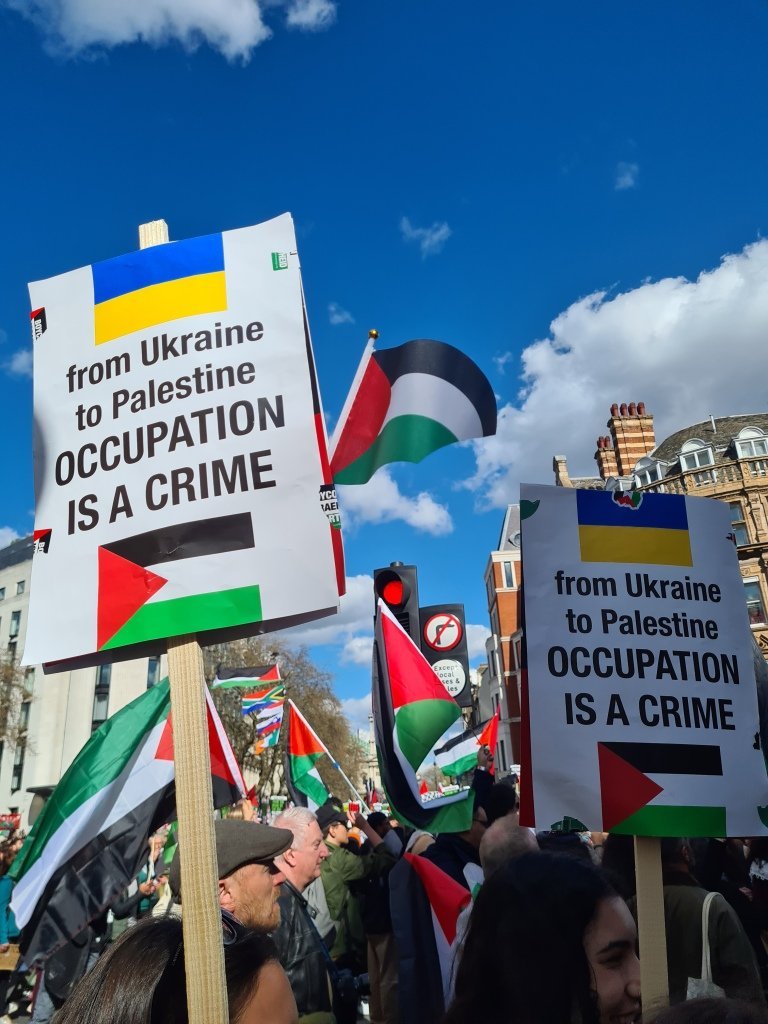Ukraine: A People’s Peace, not an Imperial Peace
Bewegung für den Sozialismus/Mouvement pour le Socialisme (Switzerland), solidaritéS (Switzerland), Sotsialnyi Rukh (Ukraine), Posle Media Collective (Russia), emanzipation – Zeitschrift für ökosozialistische Strategie (Germany, Austria, Switzerland)
Editors’ Note: The declaration below was presented on June 4 by the above organisations for international endorsement from the perspective of the self-determination of Ukraine and a just peace within a Europe based on solidarity and ecology.
The Swiss government will hold an international conference for a peace process in Ukraine on 15 and 16 June 2024 on the mountain Bürgenstock, close to Lucerne. The Ukrainian government supports this conference.
This conference is taking place in a decisive phase of the war. For months, the Russian invasion forces have been hitting gaps in the Ukrainian defences and pushing them back, with heavy losses of their own. The Russian leadership has announced a major offensive and is attacking the people in Kharkiv, a city of millions.
We support all steps towards a peace that enables the Ukrainian people to rebuild the country in a self-determined manner. Peace requires the complete withdrawal of the Russian occupying forces from the entire territory of Ukraine. With this in mind, we hope that the peace conference in Switzerland will contribute to the restoration of Ukraine’s sovereignty.
The conditions for this are extremely difficult. The representatives of the Putin regime regularly declare that they do not recognise an independent Ukraine and deny the existence of the Ukrainian people. The Putin regime purses a Great Russian project, subjugates the people in the occupied territories with terror and aims to eradicate the Ukrainian culture. The ruling regime in Russia regularly commits war crimes against the Ukraine population.
The full-scale Russian invasion of Ukraine, launched on 24 February 2022, not only calls Ukraine’s independence into question. It also encourages other authoritarian regimes to threaten neighbouring populations, occupy territories and massively expel people. In order to avoid resistance at home, the Russian army is now also recruiting people from neighbouring countries and the Global South to serve as cannon fodder.
Due to the massive – and surprising – resistance of the Ukrainian population, the governments of Europe and North America began to support the Ukrainian army in its defence against the Russian occupying forces. However, they are backing Ukraine to assert their own interests in the global imperialist rivalry. The US aim to weaken its Russian counterpart while showing strength against rising China and setting the pace for the European powers which are both partners and rivals. But despite the US Congress finally approving a comprehensive aid package for Ukraine on 20 April 2024, which had been blocked by the Republican Party for nine months, the support for Ukraine has always remained selective and insufficient.
Similarly, the economic sanctions that have been imposed by the EU and US governments against Russia and the exponents of the Putin regime are selective, inadequately targeted, and insufficient. They do not prevent Russia from continuing to export oil and gas, along with other strategically important raw materials, to fill its war chest. Some European countries have even significantly increased their imports of LNG from Russia since the start of the war. Others, such as Austria, obtain over 90% of their natural gas imports from Russia. The governments of these countries are forcing gas consumers to finance Putin’s war against the Ukrainian population.
The Swiss government, the host of the peace conference, has not only been giving tax breaks to Russian oligarchs for decades, it has also refused to confiscate the assets of these oligarchs since the start of the full-scale Russian invasion. As a major hub of international commodities trading, Switzerland has offered Russian capital excellent opportunities to acquire wealth for many years. Many bourgeois politicians have gladly welcomed these businesses in Switzerland. Through the sale of dual-use products, Switzerland contributes to equipping the Russian war machine. And finally, the Swiss financial sector facilitates the trade of Russian oil.
Both in the US and in Europe, there is a growing number of voices in the political and economic establishment who want to tie their support for Ukraine to certain conditions. They aim to pressure Ukraine to cede large territories and several million people to the Putin regime. Such a peace, enforced by major imperial powers, would strengthen the Putin regime and fail to provide a basis for a lasting democratic reconstruction of Ukraine.
We need a peace that is based on, as well as supported by, the interests of the people and of workers in Ukraine and Russia. Such a perspective can only succeed if trade unions, women’s organisations, environmental initiatives and various civil society organisations from both Ukraine and Russia play a leading role in the peace talks.
Occupation is a crime! We are guided by the principles of self-liberation, emancipation, and self-determination of working-class and all oppressed peoples beyond geopolitical considerations. In this sense, we also stand in solidarity with the Palestinian people, who have been fighting for their self-determination for decades. Likewise, we support the Kurdish and Armenian peoples and all other peoples threatened by occupation, national and cultural oppression.
Based on our positioning, supporting the Ukrainian resistance against the Russian occupation, we want to contribute to developing a common European perspective for radical socio-ecological reforms and ultimately for an ecosocialist transformation of the entire European continent in global solidarity.
By submitting this declaration for discussion, we want to contribute to a transnational process of understanding and political clarification among those left-wing forces throughout Europe and beyond that share these important convictions.
12 Principles for a Just Peace in Ukraine within a Europe based on Solidarity and Ecology
We, the undersigned organisations and initiatives, want to promote a peace process that adheres to the following 12 principles.
- Achieving a socially just and ecologically sustainable peace requires the unconditional and complete withdrawal of Russian occupying forces from Ukraine, returning the entire territory to its internationally recognised borders.
- Russia is systematically destroying cities, infrastructure, and the environment to demoralise the population and trigger a large wave of refugees. Against this daily terror, we demand that the “Western” governments support Ukraine in protecting its population and infrastructure against the bombing and missile attacks of the Russian occupying power. We are in favour of massive humanitarian, economic and military support for Ukraine from the rich states in Europe. The Ukrainian population urgently needs protection from Russian bombs and rockets.
-
We oppose attempts by “Western” governments, NATO and EU exponents to pressure Ukraine into making massive concessions to the Russian occupying power. We oppose the idea that Ukraine must cede several million people to the Putin regime. It is only up to the Ukrainian people to decide how to confront this atrocious situation of ongoing and possibly increasing occupation. We support the armed and unarmed resistance of Ukrainians against the Russian occupying power.
- We demand that all Russians who refuse military service be granted secure residence status in the countries of Europe and North America. Mass desertion is important to weaken the Russian war machine.
- We support the political struggle of Ukrainian trade unions, women’s organisations, and environmental initiatives against the neoliberal anti-labour policies of the government under President Volodymyr Zelenskyy. These policies undermine Ukraine’s socially broad-based defence against Russian occupation and render a socially just and ecologically sustainable reconstruction impossible.
-
We stand in solidarity with the anti-war movement, democratic opposition, and independent labour struggles in Russia. We also stand in solidarity with the oppressed nationalities in Russia who suffer particularly badly from the war and fight for their self-determination. It is their youth that is being exploited as cannon fodder by the Putin regime. These movements are a key factor for achieving a just peace and a democratic Russia.
-
Russia has imprisoned numerous people from Ukraine as political prisoners. Many have been sentenced to decades in prison and penal camps. We demand their unconditional release. We demand that the International Red Cross be allowed to maintain regular contact with all prisoners of war. The exchange and release of prisoners of war is a prerequisite for any just peace.
- Russia must pay reparations to the Ukrainian people. The oligarchs of Russia and Ukraine must be expropriated. Their assets must be made available to the reconstruction of Ukraine and, once the Putin regime falls to the democratic development of Russia.
-
We demand that the “Western” governments immediately cancel Ukraine’s debts. This is a crucial condition for the sovereign reconstruction of the country. The rich states of Europe and North America must set up comprehensive and broad-based support programmes for the Ukrainian people and the reconstruction of the country. This reconstruction must take place under the democratic control of the population, trade unions, environmental initiatives, feminist organisations and organised neighbourhoods in the cities and villages.
-
We oppose all projects of the European and Northern American governments, as well as international organisations, to impose a neoliberal economic agenda on the Ukrainian people. This would prolong and deepen poverty and suffering. We also denounce all efforts to sell off the property and assets of the Ukrainian population to foreign corporations. The recovery and reorganisation of agriculture, industry, energy systems and the entire social infrastructure must serve the socio-ecological transformation of Ukraine, not the supply of cheap labour, grain and hydrogen to Western European countries.
- An effective military support of Ukraine does not require a new wave of armaments. We oppose NATO’s rearmament programmes and weapon exports to third countries. Instead, the countries of Europe and North America must provide the weapons from their existing, huge arsenals that will help Ukraine to defend itself In this sense, we demand that the arms industry should not serve the profit interests of capital – to the contrary, we want to work towards the social appropriation of the arms industry. This industry should serve the immediate interests of Ukraine. At the same time, for social and urgent ecological reasons, we underline the imperative of democratically converting the arms industry into socially useful production on a global scale.
-
We want to initiate a debate on a radical reorganisation of Europe. We want to contribute to developing a common European perspective for radical socio-ecological reforms, and ultimately for a fundamental ecosocialist transformation of the entire European continent in global solidarity. Within this framework, we support the will of the Ukrainian people to join the EU, even though we reject the EU’s neoliberal foundations that impoverish millions of people and promote unequal development in Europe. We take the perspective of an accession of several countries in Eastern Europe and South-East Europe as an opportunity to reflect together on how such a radical socio-ecological change can be initiated throughout Europe, including a common energy strategy, ecological industrial conversion, pay-as-you-go unfunded pension systems, social labour regulation, solidarity-based migration policy, interregional transfer payments, and military security along with the conversion of the armaments industry. Trade union, feminist, ecological, anti-authoritarian left and socialist forces in Eastern Europe should play an important role in this debate.
Image Source: https://bit.ly/45KnlfB
You May Also Like…
Gananath: Renaissance Man
R. L. Stirrat
I met Gananath in July 1969 on the day I first arrived in Sri Lanka, Edmund Leach and Stanley Tambiah having imposed...
A Critical History of Women’s Health in Modern Sri Lanka. Darshi Thoradeniya. Orient BlackSwan (New Delhi), 2024.
Carmen Wickramagamage
Darshi Thoradeniya’s book, A Critical History of Women’s Health in Modern Sri Lanka, unearths the submerged and...
From Living With, to Drowning Under, Floods: A Village Transformed
Shashik Silva
Welewatta has always flooded. This village in the Kolonnawa Divisional Secretariat (DS), home to 1424 families, floods...




